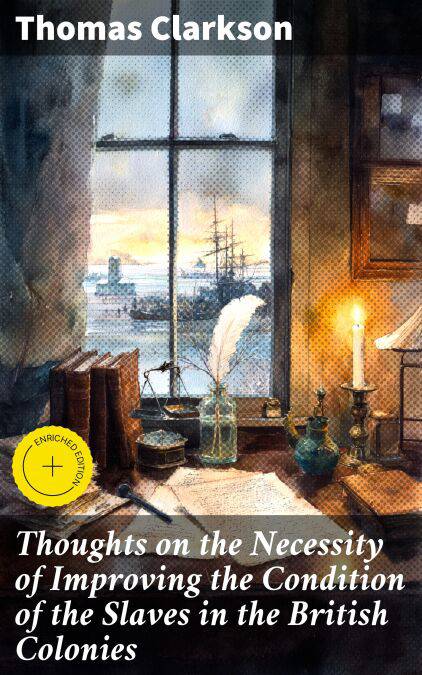
- Retrait en 2 heures
- Assortiment impressionnant
- Paiement sécurisé
- Toujours un magasin près de chez vous
- Retrait gratuit dans votre magasin Club
- 7.000.0000 titres dans notre catalogue
- Payer en toute sécurité
- Toujours un magasin près de chez vous
Thoughts on the Necessity of Improving the Condition of the Slaves in the British Colonies EBOOK
Enriched edition. A Call for Humanitarian Reform in British Colonies
Thomas Clarkson
Ebook | Anglais
1,99 €
+ 1 points
Description
In "Thoughts on the Necessity of Improving the Condition of the Slaves in the British Colonies," Thomas Clarkson presents a passionate and meticulously researched argument advocating for the humane treatment of enslaved individuals in British colonies. Written in a persuasive yet reflective style, Clarkson employs a wealth of personal testimony, statistical evidence, and philosophical reasoning to illuminate the egregious conditions faced by slaves. This powerful work is situated within the broader context of the abolitionist movement of the late 18th century, which sought to dismantle the oppressive institution of slavery and advocate for social reform. Thomas Clarkson (1760-1846) was a leading abolitionist and a pivotal figure in the fight against slavery. His profound moral sensibility and experiences collecting evidence on slave ships led to a deep-seated commitment to social justice. The impetus behind this critical work stemmed not only from his own convictions but also from his belief that public awareness and consciousness could catalyze legislative change, ultimately leading to the abolition of the slave trade in the British Empire. This book is essential reading for those interested in social justice, history, and ethical philosophy. Clarkson's profound insights and compelling rhetoric not only serve to educate readers about the brutalities of slavery but also challenge them to consider their societal responsibilities in the face of injustice. With its historical significance and moral urgency, this text remains a powerful call to action for contemporary audiences.
In this enriched edition, we have carefully created added value for your reading experience:
- A succinct Introduction situates the work's timeless appeal and themes.
- The Synopsis outlines the central plot, highlighting key developments without spoiling critical twists.
- A detailed Historical Context immerses you in the era's events and influences that shaped the writing.
- A thorough Analysis dissects symbols, motifs, and character arcs to unearth underlying meanings.
- Reflection questions prompt you to engage personally with the work's messages, connecting them to modern life.
- Hand‐picked Memorable Quotes shine a spotlight on moments of literary brilliance.
- Interactive footnotes clarify unusual references, historical allusions, and archaic phrases for an effortless, more informed read.
In this enriched edition, we have carefully created added value for your reading experience:
- A succinct Introduction situates the work's timeless appeal and themes.
- The Synopsis outlines the central plot, highlighting key developments without spoiling critical twists.
- A detailed Historical Context immerses you in the era's events and influences that shaped the writing.
- A thorough Analysis dissects symbols, motifs, and character arcs to unearth underlying meanings.
- Reflection questions prompt you to engage personally with the work's messages, connecting them to modern life.
- Hand‐picked Memorable Quotes shine a spotlight on moments of literary brilliance.
- Interactive footnotes clarify unusual references, historical allusions, and archaic phrases for an effortless, more informed read.
Spécifications
Parties prenantes
- Auteur(s) :
- Editeur:
Contenu
- Nombre de pages :
- 77
- Langue:
- Anglais
Caractéristiques
- EAN:
- 8596547505785
- Date de parution :
- 11-08-23
- Format:
- Ebook
- Protection digitale:
- Digital watermarking
- Format numérique:
- ePub

Seulement chez Librairie Club
+ 1 points sur votre carte client de Librairie Club
Les avis
Nous publions uniquement les avis qui respectent les conditions requises. Consultez nos conditions pour les avis.





